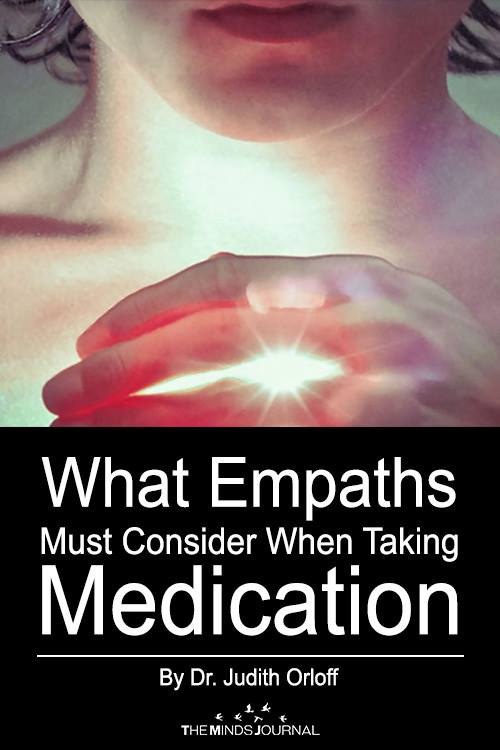How medication affects empaths and sensitive people is more intense than you may think. Since many empaths experience chronic sensory overload, anxiety or depression, conventional physicians often send them to psychiatrists for medication.
In “The Empath’s Survival Guide” I discuss empaths, their bodies, and health. It’s important for sensitive people to listen to the wisdom of their bodies. Many physicians go straight to antidepressants and anti-anxiety medications when treating empaths, but, in general, initially I recommend not using them with such sensitive souls. Sometimes, my patients just need to be kinder to themselves and make certain adjustments which make their lives easier.
Read The Biggest Cause Of Anxiety
For instance, Jan came to me experiencing intense anxiety when driving the Los Angeles freeways. The multiple lanes of cars and huge trucks whizzing by in both directions overwhelmed her and made her light-headed. Some empaths, including myself, have this aversion to freeways. The massive amount of traffic going at high speeds, and erratic, upset drivers are just too much stimulation for some of us to process. I haven’t driven the freeways for years.
Although Jan had practiced deep breathing exercises before getting in the car, and took shorter freeway trips to get used to driving, these strategies were insufficient. Her physician had suggested anti-anxiety medications, but she wasn’t comfortable taking them. I presented Jan with a simple alternative. Instead of continuing to make herself crazy trying to “get over” her driving anxiety, she could give herself permission to avoid freeways when possible and take some wonderful side streets across the city, as I do. Jan felt tremendous relief with this solution. She simply allowed for more travel time to her meetings. I also urged Jan to stop pressuring herself to “be like other people,” a mistake many sensitive people make. You often have special needs that must be respected–and these needs are okay. You’re not failing or copping out by finding ways to be kind to yourself.
The softer, easier solution to a problem can be a merciful way for you to resolve anxiety without having to turn to medication.
How Medication Affects Empaths and Sensitive People:
If empaths have been chronically depleted by trauma or stress, they may require medication for depression and anxiety to balance their biochemistry. I recommend prescribing these mainly for the short term. Interestingly, I’ve observed that many empaths require a much lower dose than other people to get a positive effect. For instance, a sliver of an antidepressant can work wonders for highly sensitive patients. A mainstream physician might write this off as a “placebo response.” I disagree. How medication affects empaths and sensitive people is more intense than you may think. Empaths are just more sensitive to everything, including medications. We often can’t tolerate the usual doses that conventional medicine deems effective.
Always ask yourself, “What is my body’s response to medication?” It doesn’t matter if you’re the only one who ever had a side effect if you experience something, it IS real. I get so tired of doctors telling me, “Well, you’re the only one to experience ____so it must not be real!” As an empath, I’ve learned to trust my body above all. I hope you do too.
Read How Empaths Can Recover from Trauma And PTSD
In addition, I’m also fascinated by new research about how pain medications can inhibit empathy. Ohio State University researchers recently found that when participants who took Tylenol (Acetaminophen) learned about the mishaps of others, they experienced less dismay than those who didn’t get the drug. So, if you have a conflict with a family member and you had just taken Tylenol, this research suggests that you might be less compassionate. Knowing that Tylenol decreases empathy is important since 52 million Americans take a substance containing it every week!
It is important to know how the medication affects empaths and sensitive people. If you’re an empath who needs medication, I suggest working with an integrative healthcare practitioner who understands subtle energy so you can find the best dosage for your body. Be sure to share with your doctor how your body responds to the dose of medication you are given so you can regulate it if necessary. Most important, speak up if you are uncomfortable. Remember, the point of taking any medication or taking part in any therapeutic intervention is to focus on your healing.
(Adapted from The Empath’s Survival Guide: Life Strategies for Sensitive People by Judith Orloff MD.)









Leave a Reply
You must be logged in to post a comment.